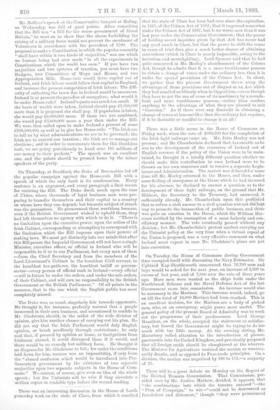There was a little scene in the House of Commons
on Friday week, when the vote of £600,000 for the completion of the Irish light railways came on. Mr. John Morley was not present ; and Mr. Chamberlain declared that, favourable as he was to the development of the resources of Ireland out of English revenue if the policy of the Union were to be main- tained, he thought it a totally different question whether we should make this contribution in case Ireland were to be thrown on her own resources and to receive a separate Legis- lature and Administration. The matter was debated for some time till Mr. Morley returned to the House, and then, under some feeling of annoyance at the blame which he had incurred for his absence, he declined to answer a question as to the development of these light railways, on the ground that Mr. Hibbert, the Secretary to the Treasury, had answered it sufficiently already. Mr. Chamberlain upon this protested that to refuse a civil answer to a civil question was not the best, way to promote the transaction of public business, and there was quite an emotion in the House, which Sir William Har- court soothed by the assumption of a most fatherly and con- ciliatory manner. The vote eventually passed without any division ; but Mr. Chamberlain's protest against carrying out the Unionist policy at the very time when a virtual repeal of the Union is proposed, was a very effective comment on what Ireland must expect in case Mr. Gladstone's plans are put into execution.


































 Previous page
Previous page